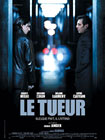
|
The Killer review
:. Director: Cédric Anger
:. Starring: Gilbert Melki, Grégoire Colin
:. Running Time: 1:30
:. Year: 2008
:. Country: France
|
The directorial debut from Cédric Anger, co-writer of Le Petit Lieutenant, The Killer chronicles the intriguing relationship between an investment analyst (Gilbert Melki — Intimate Strangers, The Right of The Weakest) and the man who has been sent to kill him (Grégoire Colin — Beau Travail, The Dreamlife of Angels).
Starting with strong sense of paranoia, as the central character knows his days are numbered, the film then settles for a surprisingly serene atmosphere as the relationship between the two men develops.
Through Mr. Melki's character, we're told that the worst thing about death is not knowing when it will come and that a man can make peace with his fate as long as his final days can be planned.
Centered mostly on these two characters, with the killer as a metaphor for the reaper, The Killer echoes Ingmar Bergman's Seventh Seal, which isn't very surprising given the cinephile background of Mr. Anger, who worked for the emblematic French magazine Les Cahiers du Cinema.
What interests the filmmaker here isn't the final act itself but rather what goes through the minds of the victim and the executioner while they wait for the sentence. Both are painted as flawed human beings who seem to be victims of their surroundings — there is no good character in this film. Mr. Anger also seems to point at videogames and TV as causes for the normalization of murder in our society — the killer is a childish character who doesn't really know the value of his acts.
Though it takes place in Paris, the film avoids any touristy clichés. We follow the characters from the modern area of Bercy to the suburbs and the underbelly of the city; all the locations have been chosen to reflect the emotional states of the characters, whether it's their inner struggles, their coldness or their solitude.
With its theme, slow pace and character-driven dimension, The Killer can be defined as modern film noir, reminiscent of the universe of the likes of Jules Dassin (Rififi). But what probably attests to the success of this work is that, when fate comes, we not only do not feel sadness, as both characters won us over with their motivations, but we also get a strong sense of happiness, witnessing a highly satisfying amoral epilogue; there is no better proof of the success of film noir than when it corrupts its audience.
Fred Thom

 Reviews of French Movies: 2012 - present Reviews of French Movies: 2012 - present
 French Films: 1998 - 2011 Reviews French Films: 1998 - 2011 Reviews
 French Music Reviews French Music Reviews
|
|


